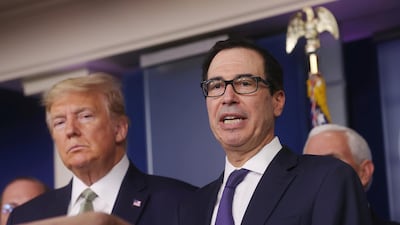A huge fiscal stimulus that would see billions of dollars provided directly to tax payers was the latest measure proposed by the US administration as it sought to avoid the country plunging into recession.
Lawmakers have been rushing to come up with policy responses as economic activity is curtailed across the country to prevent the spread of the coronavirus.
Measures worth $105 billion was passed by US lawmakers on Wednesday and approved by President Donald Trump on Thursday that includes extended safety net measures for unemployed people and free testing for those suspected to be infected by the virus.
However, a much bigger package worth up to $1.3 trillion is hurriedly being put together, with Treasury Secretary Steven Mnuchin urging congress to pass the bill next week. The new, larger stimulus could involve direct payments to taxpayers as an incentive to boost spending. The government will look to finance this by a series of new 25-year and 50-year bonds, according to Bloomberg.
Markets have witnessed a huge sell-off and investors have flocked to safe-haven assets, fearful of the damage that could be inflicted on the economy as a result of disruptions caused by the coronavirus outbreak.
"We expect global GDP growth to drop effectively to zero this year, matching the major recessions of 1982 and 2009," Bank Of America analysts said in a note.
"Among the big-three economies, the US and the Euro area will see negative growth, while Chinese growth is expected to come in at a paltry 1.5 per cent."
The Dow Jones index lost another 6.3 per cent on Wednesday, bringing its total losses over the past month to more than 32 per cent. The S&P 500 dropped 5.2 per cent, extending its one-month loss to 29 per cent.
“Markets don’t like so much uncertainty,” said Nishit Lakhotia, head of research at Bahrain-based investment bank Sico.
“We are going to see a spike in unemployment and now the Fed has more or less used up most of the ammunition it had to propel the economy,” he said.
The US Federal Reserve slashed rates by 100 basis points to near-zero earlier this week, after a previous 50 basis point rate cut earlier this month. It also said it would embark on a new quantitative easing programme where it would buy up to $700bn of bonds and mortgage-backed securities.
“Markets will stabilise only when they see this pandemic will be nearing its end and normalcy coming back,” Mr Lakhotia said.

